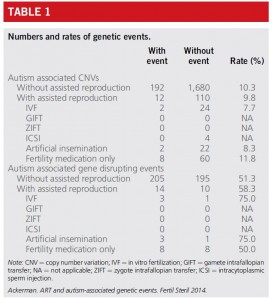(Editor’s note: I’m very pleased to be able to present this guest post by one of our new child psychiatry fellows, Sean Ackerman, who recently published this important study – DR).
These days autism spectrum disorder (ASD) and assisted reproduction are both medical issues that frequently wind up in the media and are becoming ever more commonplace in our lives. Moreover, at times both issues have been lightning rods of controversy. Not surprisingly then – and in the context of ASD being linked to environmental factors – some have wondered if assisted reproduction and ASD were associated. There has even been some concern that some forms of assisted production – including in vitro fertilization, gamete intrafallopian transfer, or zygote intrafallopian transfer – could possibly even cause autism associated genetic events.
Researchers have looked at this question via a number of epidemiological studies, with mostly reassuring results. However, there has been some conflicting evidence and no genetic studies have been done… until now. 
Via a large sample of almost 2,000 children with autism, we examined the use of assisted reproduction and any association with autism associated genetic events, publishing our results recently in the journal Fertility and Sterility. What we found was a completely negative result: no statistically significant differences in copy number variations or autism-associated gene-disrupting events were found when comparing ASD patients exposed to assisted reproduction with those not exposed to assisted reproduction.
Furthermore, in the context of assisted reproduction maternal age was identified as a potential contributor to ASD associated genetic events, meaning the characteristics of parents using assisted reproduction (not assisted reproduction itself) may explain any association previously found in epidemiological studies between ASD and assisted reproduction.
Overall, we believe this finding is important because when people consider assisted reproduction they often have many questions and anxieties. We hope that the above finding can help provide some important information to hopeful parents interested in assisted reproduction who are specifically concerned with the issue of autism.
Reference
Ackerman A, Wenegrat J, Rettew D, Althoff R, Bernier R. No increase in autism-associated genetic events in children conceived by assisted reproduction. Fertility and Sterility 2014; May 17 epub ahead of print.
Tags: assisted reproduction, autism, autistic spectrum, IVF


